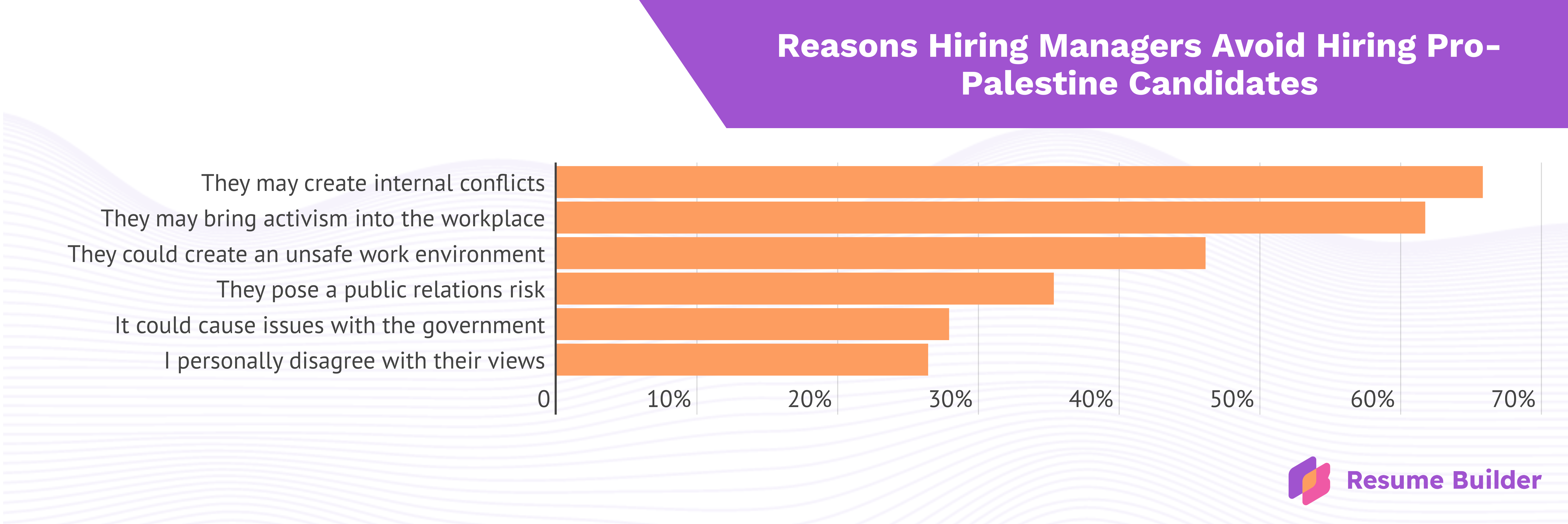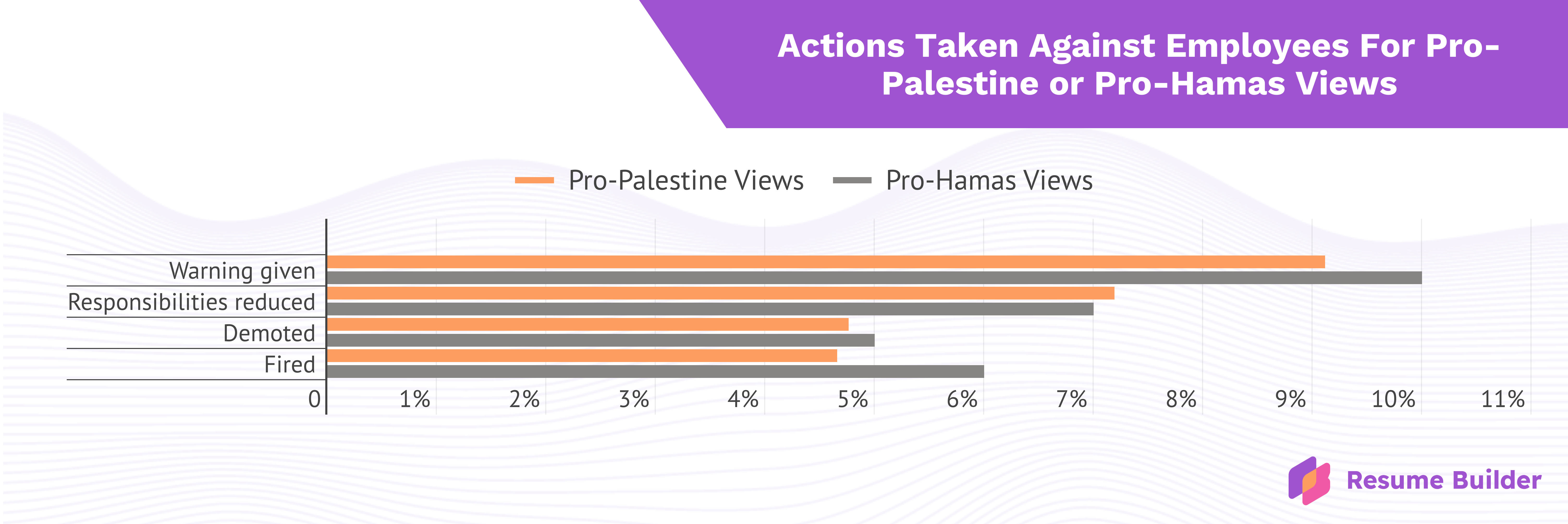In light of Columbia University expelling and revoking degrees of pro-Palestine activists and President Trump’s vow to deport pro-Palestinian protestors, Resume Builder surveyed 988 U.S. hiring managers in March 2025. We sought to understand how, in today’s heightened political climate, workers who hold pro-Palestinian or pro-Hamas views are being considered for jobs — or whether their current employment is at risk.
Key findings:
- 8% of hiring managers have rejected candidates who expressed pro-Palestine views, and 19% would consider doing so
- 8% chose not to hire candidates with pro-Hamas views, and 35% would potentially do the same
- Hiring managers are concerned such candidates may create conflict, an unsafe environment, or public relations issues
- 5% have terminated workers for having pro-Palestine views and 6% for pro-Hamas views
- One-third of companies are more cautious about hiring political detractors under the Trump administration
1 in 10 Hiring Managers Have Rejected Candidates for Pro-Palestine Views
About 8% of hiring managers say they’ve rejected a candidate for having pro-Palestine views, and another 19% say they would consider doing so. Conversely, 73% of hiring managers say they wouldn’t avoid hiring someone for holding these views.
Among hiring managers who have or would consider rejecting candidates with pro-Palestine views, 66% cite concerns about internal conflict, 62% worry about workplace activism, 46% believe it could create an unsafe environment, and 35% are concerned about negative publicity.
Hiring managers are more wary of candidates with pro-Hamas views. While 8% say they’ve rejected candidates for this reason, 35% say they would consider it. Among these managers, 60% cite internal conflict as a concern, followed by safety (54%), activism (52%), public relations risks (35%), and potential issues with the government (33%).

“U.S. federal law does not protect private-sector employees from discrimination based on political beliefs, and the Civil Rights Act of 1964 does not list political views as a protected category, though some states offer varying degrees of protection,” says Resume Builder’s Chief Career Advisor Stacie Haller. “However, affiliations with terrorist groups are not protected under any law. Employers can legally take action, including termination, against individuals supporting such organizations, especially if it threatens workplace safety or violates company policies. While political beliefs may be protected in some cases, support for terrorism is unequivocally not.”
Candidates are revealing their views during the hiring process or through social media
Hiring managers are primarily learning about candidates’ pro-Palestine or pro-Hamas views through social media. More than half (53%) say they’ve uncovered this information during social media screenings. Others say candidates voluntarily discussed their activism during the hiring process (48%), it came up in background checks (40%), or it was shared in interviews or included on resumes (39%). Some hiring managers (29%) even discovered this information through conversations with a candidate’s references.
“It’s crucial for job seekers to curate their online presence thoughtfully. Controversial political posts might hinder job opportunities. Recognizing that employers might access and evaluate publicly available information underscores the importance of managing one’s digital footprint carefully,” Haller says.
Companies Have Fired, Warned, and Demoted Workers for Pro-Palestine or Pro-Hamas Views
Some companies have taken disciplinary action against employees for their political views. Regarding pro-Palestine views, 5% of hiring managers say an employee at their company was fired, 9% say someone was issued a warning, 5% report a demotion, and 7% say responsibilities were reduced.
Responses are similar for pro-Hamas views, with 6% of hiring managers reporting an employee was fired, 10% issued a warning, 5% demoted, and 7% had responsibilities reduced.

“To maintain a professional and harmonious workplace, employees should refrain from engaging in political discussions that could lead to conflicts or a hostile environment. Employers are encouraged to establish clear policies that balance free expression with professionalism, setting expectations for respectful communication among staff,” Haller discusses.
One-Third Companies Are More Cautious About Hiring Political Detractors Under Trump
When asked about the political climate under the Trump administration, 14% of hiring managers say their company became significantly more cautious about hiring individuals with opposing political views, while 20% say they became somewhat more cautious.
“The Trump administration has actively addressed political dissent, notably by pressuring institutions like Columbia University to modify policies following pro-Palestinian demonstrations. This heightened scrutiny has led companies to exercise greater caution when considering politically active candidates, aiming to avoid potential controversies. While many organizations maintain neutrality, there is a growing trend of businesses taking stances on social and political issues and hiring processes reflecting the current polarized environment,” Haller notes.
Methodology
This survey, launched on March 20, 2025, was commissioned by ResumeBuilder.com and conducted online by the polling platform Pollfish. Overall, 988 U.S. full-time manager-level employees completed the survey.
To qualify for the survey, all participants had to have a household income of at least $75,000, hold an associate degree or a higher level of education, have a managerial-level role or higher, and work at a company with more than 11 employees.
Respondents also had to indicate that they are involved in hiring decisions at their company.
For all media inquiries, contact [email protected].
